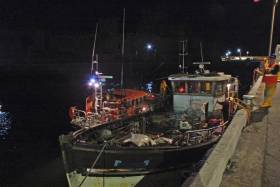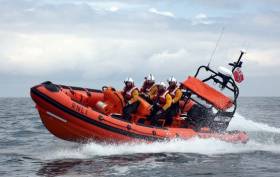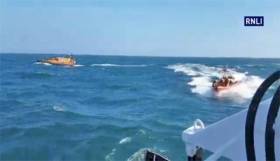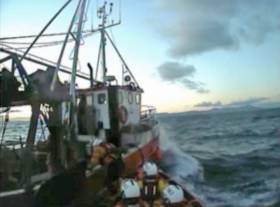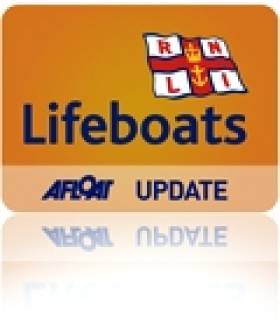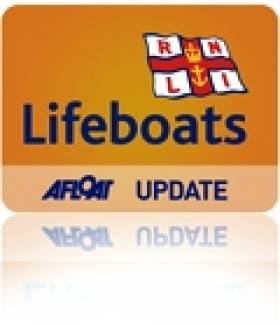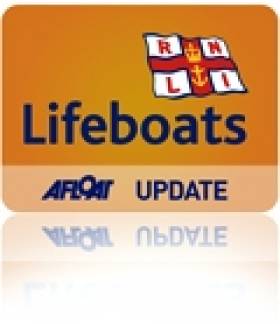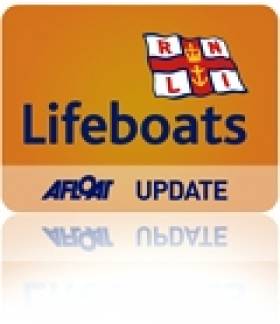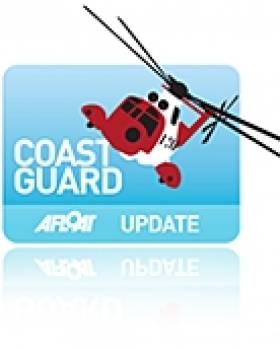Displaying items by tag: Kilkeel
Dramatic Rescue Of NI Trawler In Irish Sea Off Isle Of Man
#RNLI - Two British naval war ships, three helicopters and a fishing vessel joined Peel RNLI in the dramatic rescue of a trawler between Northern Ireland and the Isle of Man in the early hours of Wednesday morning (21 September).
The 20m converted fishing vessel from Kilkeel in Co Down was on passage in the Irish Sea from Glasgow to Conwy in Wales when it started taking water through the stern tube and was in danger of sinking some 11 miles west of the Isle of Man.
Peel's all-weather lifeboat Ruby Clery, under the command of coxswain Paul Cain, launched shortly after the volunteer crew were alerted at 1.30am.
Northern Irish fishing vessel Stephanie M gave shelter to the casualty until the lifeboat crew were able to put a pump on board to evacuate the water.
The vessel, with three adults and one child on board, was soon stabilised and helicopters and other vessels stood down. The trawler was then taken in tow by the lifeboat bound for Peel.
During this time, a young woman and the child were taken ill, so the tow was dropped about 15 minutes from Peel and the two taken to a waiting ambulance where they were treated and then removed to Nobles Hospital.
Meanwhile, the lifeboat returned to the stricken vessel, which was now under its own power, and escorted it into Peel Harbour at about 5am.
"We advise people to always check their equipment before leaving port," said Cain after the callout.
#RNLI - Kilkeel RNLI helped bring a fisherman to safety yesterday evening (Tuesday 17 May) after he was injured while fishing for prawns off the Co Down coast.
The volunteer lifeboat crew was alerted at 4.50pm and requested by Belfast Coastguard to go to the aid of an injured man on a 68ft fishing trawler in Dundalk Bay.
The inshore lifeboat, helmed by Alan Henning and with three crew members onboard, launched within minutes and made its way to the scene some six nautical miles from the lifeboat station.
Weather conditions at the time were described as wet with a lot of rain and a 1.5m swell.
Once on scene, lifeboat crew member Andrew McConnell was transferred from the lifeboat on to the fishing vessel, where he assessed the casualty and ensured he was wearing a sea survival suit before being moved from the trawler.
The injured man was made comfortable before he was strapped and lowered down into the lifeboat where he was then transported back to Kilkeel and handed over into the care of a waiting ambulance.
Speaking following the callout, Kilkeel RNLI lifeboat operations manager John Fisher said: "There wasn’t enough water in the harbour yesterday afternoon to allow the fishing trawler make its way into Kilkeel so we were happy to assist.
"We would like to wish the injured man a full and speedy recovery from his ordeal."
Kilkeel Lifeboat Aids Fishing Vessel Rapidly Taking On Water
#RNLI - Kilkeel RNLI's volunteer lifeboat crew launched at 9.20am yesterday morning (Monday 14 March) to go the aid of a fishing vessel rapidly taking in water about 25 miles southeast of Kilkeel, Co Down.
The vessel was in a heavy swell when water was seen in the fish room. The boat’s pump was unable to cope with the water entering and at one stage the fish room was three-quarters full of water. It had begun to affect the stability of the boat when the alarm was raised and help was dispatched.
When Kilkeel RNLI arrived on scene, the lifeboat was carefully manoeuvred by its volunteer crew alongside the vessel in an increasingly heavy swell, and two of the lifeboat crew went aboard the fishing vessel with a salvage pump. Newcastle RNLI’s all-weather lifeboat was also on scene to render assistance.
The Kilkeel lifeboat then transferred a further pump from the Newcastle lifeboat, and with all the pumps working the boat was kept afloat. The two lifeboats then escorted the fishing boat under her own steam safely into Kilkeel Harbour, arriving at about 12.45pm.
John Fisher, Kilkeel RNLI lifeboat operations manager, said: "If the incident had happened further out to sea then the operation would have been more difficult, but with the Kilkeel and Newcastle lifeboats co-operating well together, the fishing boat and its crew were brought safely ashore.
Kilkeel RNLI's volunteer lifeboat crew on this callout were Raymond Newell, Alan Henning, Andrew McConnell and Wayne Marshall.
Kilkeel Lifeboat Aids Fishing Boat On Fire
#RNLI - Kilkeel RNLI went to the aid of the fishing boat which reported a fire in its engine room on Wednesday evening (24 February).
The 14m fishing vessel, with two men on board, was 11 miles south-east of Kilkeel when the incident was reported at 5.20pm.
Arriving on the scene, the lifeboat crew found that the fire had been extinguished but there was a problem with the steering.
Kilkeel RNLI volunteer crew member Alexander McCauley boarded the stricken vessel to assess the damage and address the steering issues.
Once repaired, the fishing vessel headed for Kilkeel but after about two miles under her own steam the steering broke down again, with the rudder locked to port.
The vessel was then taken under tow by the Kilkeel lifeboat for the remaining five miles to Kilkeel Harbour.
Another local fishing boat, Oceanus with skipper Neil McKee, followed the vessels to Kilkeel, while the Irish Coast Guard helicopter Rescue 116 was also in attendance till the vessel was safely under tow.
The Clogherhead RNLI lifeboat was also dispatched to the scene but was released from duty once the team's Kilkeel colleagues had the situation under control.
Weather conditions during the callout were described as good.
"Putting a crew member aboard another vessel and towing the vessel is something that we practice regularly and everything went smoothly," said Kilkeel RNLI helm Gerry Smyth. "With the conditions being good the rescue went exactly as planned.’
John Fisher, Kilkeel RNLI lifeboat operations manager, added that the successful rescue demonstrated the excellent working relationships that have been developed between the coastguard, Clogherhead RNLI, Rescue 116 and the Kilkeel lifeboat crew.
Kilkeel RNLI's crew for the callout comprised helm Gerry Smyth and crew members William Charleton, Alexander McCauley and Sam Graham.
Kilkeel Lifeboat Crew Praised For Professionalism
#RNLI - Kilkeel RNLI's volunteer lifeboat crew have been recognised for their professionalism by a nearby business.
Mark Forkin of NuTech Renewables in Warrenpoint visited Kilkeel Lifeboat Station on Tuesday (1 December) to present a boat maintenance hamper to the crew in recognition of their positive and selfless attitude, their willingness to drop everything at a moment's notice to help other people, and their strong commitment to training and achievements in continuous improvement.
Forkin said that he and the rest of his team watched a yacht rescue in Carlingford Lough and all were impressed by the excellent teamwork and professionalism displayed.
#dinghycapsize – Volunteer lifeboat crew with Kilkeel RNLI launched yesterday evening at 6.30pm following reports of two people in the water off Killowen Point on Carlingford Lough. It is understood a member of the public raised the alarm on seeing two people in the water after their dinghies capsized.
Conditions at the time were choppy with a force four north westerly wind and good visibility. On arriving at the scene the lifeboat crew recovered the two exhausted casualties onto the lifeboat and took the two dinghies, which were drifting, under tow. The two were very cold but conscious. The lifeboat crew returned to Killowen Yacht club and was met by members of the South Down coastguard team and awaiting ambulance.
Commenting on the rescue John Fisher, Kilkeel RNLI said; 'This was a challenging callout for the lifeboat crew. The capsize happened near a sandbank and the lifeboat helm had to manoeuvre the lifeboat very carefully to safely recover the two people. The casualties were exhausted and very cold and our crew gave them warm blankets before returning them to shore.'
#RNLI - Kilkeel RNLI volunteer lifeboat crew Ernest McKee (helm), William Charleton, Suzanne McCullough and Gerry Smyth responded to a call at 8pm last night (Sunday 10 May) to go to the aid of the 25ft yacht Sundancer in difficulty south of the Hellyhunter Buoy, off Carlingford Lough.
The Sundancer, which had left Howth with a crew of three, had suffered a ripped headsail along with reported engine failure and an exhausted crew. There was a Force 6 northerly wind with a moderate sea and moderate visibility.
On coming alongside, Kilkeel RNLI crewmember Charleton managed to get onboard the yacht and assessed the state of health of the crew, one of whom was suffering from violent seasickness. He gave appropriate assistance to the casualty, making him as comfortable as possible using the ripped sail to keep the wind off.
Meanwhile, McCullough maintained contact with the yacht's crew to reassure them they were safe. When the sails were lowered, a towline was established and the vessel was towed to Carlingford Marina.
Following the callout, Smyth stated that "the rescue was carried out under difficult and trying conditions and helm Ernest McKee did a great job manoeuvring the lifeboat into position to allow William to get onboard the yacht.
"It was a textbook location and recovery operation; we train regularly for such tasks and everything went smoothly."
Kilkeel Lifeboat Manager Roy Teggarty Retires
#RNLI - Roy Teggarty has retired as lifeboat operations manager at Kilkeel RNLI in Co Down.
At a social evening in the local British Legion on Friday 27 March, Teggarty was pleased to greet fellow Kilkeel RNLI colleagues as well as staff and volunteers from neighbouring stations.
Coming from a fishing and nautical background, Teggarty was an obvious choice when in 1994 the lifeboat crew in Kilkeel were looking for a deputy landing authority (DLA).
He brought hard work, dedication and excellent organisational skills to the station ensuring, with the help of others in management, that the building and the equipment were always up to the required tasks.
In the year 2000, all his experiences were recognised when he was appointed as lifeboat operations manager (LOM). Over the years he has ensured that the crew have maintained the high professional standards they have always set for themselves.
Commenting on his years of service, Teggarty stated that the majority of callouts have been routine but, as always with this role, some have been very very dark tragic days.
"I have thoroughly enjoyed my time as DLA and LOM of Kilkeel RNLI, working with a dedicated team of volunteers, not only on the operational side but also with the excellent team of fundraisers," he said.
"Although I am standing down as LOM, I am sure that the station will continue to provide an excellent and professional service under the leadership of their new LOM John Fisher. I wish them all the best for the future in continuing to save lives at sea."
Thanking him for his many years of service, Leslie Campbell, Kilkeel RNLI volunteer lifeboat press officer, said: "The crew and fundraisers would like to wish Roy a long and rewarding retirement free from early morning alarm calls and thanks for your dedication, loyalty and years of faithful service."
Kilkeel Lifeboat Attends 'Fiercely Burning' Yacht
#RNLI - Kilkeel RNLI's volunteer lifeboat crew responded early yesterday morning (29 June) to a 40ft two-masted glass fibre yacht reported to be burning out of control.
The owner of the yacht, anchored south south-east of Rostrevor Pier on Carlingford Lough, had been contacted and it was confirmed there were two gas cylinders aboard the yacht.
The Kilkeel lifeboat Frank William Walton was launched at 2.20am and quickly reached the stricken yacht, which very quickly was ablaze from bow to stern. There was a slight sea and good visibility with light and variable northerly winds.
One of the propane gas cylinders had already exploded so the lifeboat, with four firefighters from Warrenpoint and a mobile firefighting pump aboard, stood off at a safe distance.
When the fire had somewhat subsided the lifeboat returned to the yacht and the flames were extinguished. The lifeboat left the firefighters and the pump ashore at Warrenpoint and returned safely to the boathouse in Kilkeel at 6.45am.
Lifeboat helm Gerry Smyth said: "It was vital that the lifeboat crew, the firefighters and the lifeboat were kept out of danger whilst there was the possibility of the gas cylinders exploding.
"The yacht was extensively damaged and still afloat when we left the scene but importantly no lives were lost."
UK Coastguard Agency Head Meets Fishermen's Mission in NI
#Coastguard - The chief executive of the UK's Maritime and Coastguard Agency (MCA) was in Northern Ireland yesterday (4 March) to discuss future collaboration with the Royal National Mission to Deep Sea Fishermen.
As Fishupdate.com reports, the charity - also known as the Fishermen's Mission - provides emergency support to fishermen and their families in times of need.
Sir Alan Massey of the MCA was in Kilkeel, Co Down to meet with the charity's CEO David Dickens to find out how best to work together on their common ground of safety at sea.
"We want to encourage a culture where it becomes normal practice for all fishermen to wear a lifejacket or personal flotation device (PFD) when out at sea," said Massey.
Dickens added that the Fishermen's Mission is "keen to engage with all agencies and organisations that seek to reduce the number and severity of incidents in fishing".



























